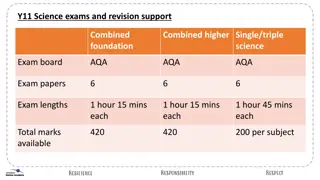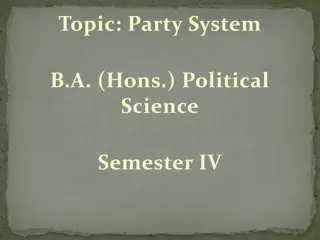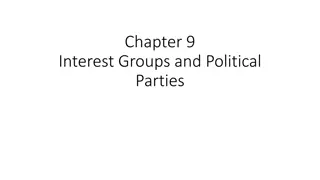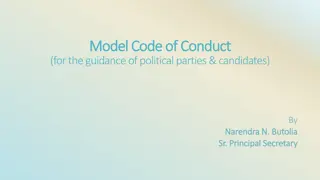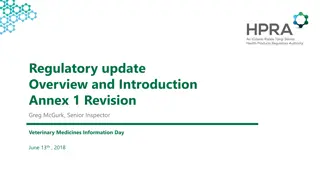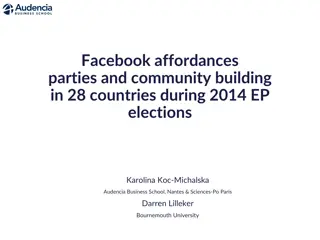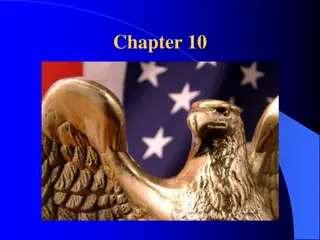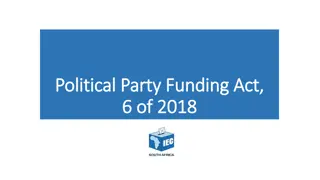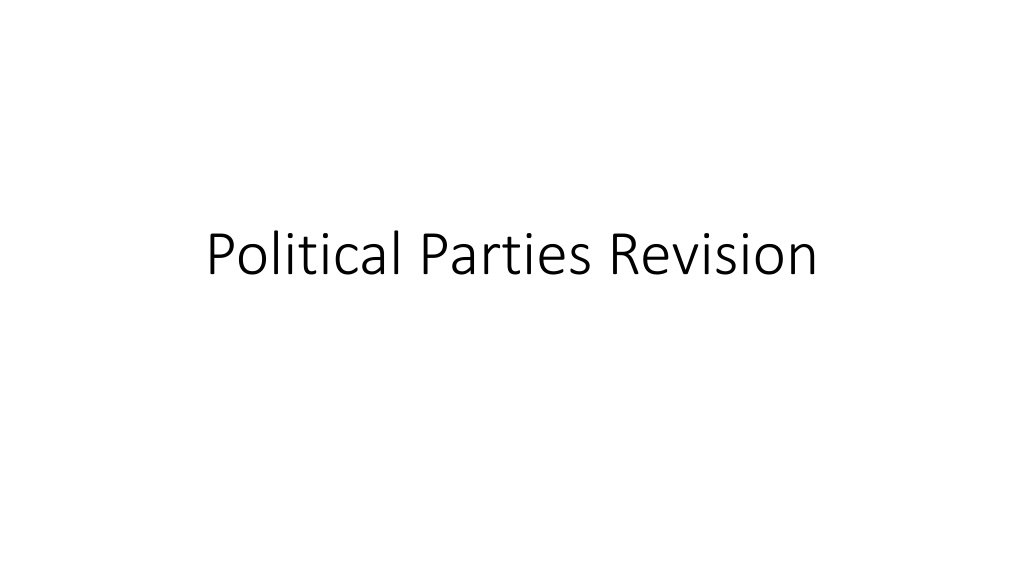
Understanding Political Parties in the UK
Explore the history, functions, and impact of major political parties in the UK, including the Conservative Party, Labour Party, and Liberal Democrats. Learn about their origins, ideologies, and current manifestos, as well as the organization, funding, and success factors of political parties in the UK.
Download Presentation

Please find below an Image/Link to download the presentation.
The content on the website is provided AS IS for your information and personal use only. It may not be sold, licensed, or shared on other websites without obtaining consent from the author. If you encounter any issues during the download, it is possible that the publisher has removed the file from their server.
You are allowed to download the files provided on this website for personal or commercial use, subject to the condition that they are used lawfully. All files are the property of their respective owners.
The content on the website is provided AS IS for your information and personal use only. It may not be sold, licensed, or shared on other websites without obtaining consent from the author.
E N D
Presentation Transcript
Political Parties Component 1.2 Homework L1 What is a political party? Features, functions, manifestoes and mandates 2 The History of the Conservative Party - Origins 3 The History of the Conservative Party One Nation 4 The History of the Conservative Party New Right 5 The History of the Labour Party - Origins 6 The History of the Labour Party Welfare Labour 7 The History of the Labour Party New Labour 8 This History of the Liberal Democrats 9 Other political parties - Greens, UkIP, SNP, DUP. 10 Current Manifestos 11 Organisation and Structure of the Parties 12 Types of political parties mass membership, regional, issue, class 13 Two party or mutli party system? 14 Funding Political parties 15 Why do political parties succeed or fail? ( Influence of the media)
Personal Learning Checklist Personal Learning Checklist - - Political Parties Political Parties UK Politics UK Politics - - Component 1.1 Component 1.1 Break down of topics: Learnt it Revised it Know it L1 What is a political party? Features, functions, manifestoes and mandates 2 The History of the Conservative Party - Origins 3 The History of the Conservative Party Disraeli, Cameron and the One Nation 4 The History of the Conservative Party Thatcher, the New Right and Neo-Liberalism 5 The History of the Labour Party - Origins 6 The History of the Labour Party Atlee, Old Labour and the Welfare State 7 The History of the Labour Party Blair, New Labour and the Third Way 8 This History of the Liberal Democrats 9 Other political parties - Greens, UKIP, SNP, DUP. 10 Current Manifestos What did each party offer in 2017? 11 Organisation and Structure of the Parties 12 Types of political parties mass membership, regional, issue, class 13 Two party or mutli-party system? 14 How are the political Parties funded? 15 The debate on state funding of political parties? 15 Why do political parties succeed or fail? ( Influence of the media)
Political Parties 1. 1. 1. 1. 1. 1. 1. 1. 1. 1. 1. 1. 1. 1. 1. 1. 1. 1. 1. 1. 1. 1. 1. 1. 1. 1. 1. 1. Tories Conservative Party Robert Peel Corn Laws Benjamin Disraeli Margaret Thatcher David Cameron Teresa May Political Parties Class Interest politics Demographic time bomb Manifesto Mandate The New Right Neo-Liberalism Neo-Conservatism Monetarism 1986 Big Bang Supply-side economics Deregulation Privatisation Post-War Consensus Non-partisan de-alignment Law and Order One Nation Conservatism Organic society Pragmatism
1. New Labour 1. Old Labour 1. Momentum 1. Jeremy Corbyn 1. Tony Blair 1. Clement Atlee 1. Nationalisation 1. Trade Unions 1. Fabian Society 1. Beatrice Webb 1. Enabling State 1. Longest Suicide note in history 1. 1. Post war consensus 1. 1. Birth of the Labour Party 1. 1. One Nation Conservatism 1. 1. Callaghan's Winter of Discontent 1. 1. Blair s New Labour 1. 1. ConDem Coalition 1. 1. DUP 1. 1. Liberal Democrats 1. 1. SDP 1. 1. Devolution 1. 1. SNP 1. 1. Plaid Cymru 1. 1. Green Party 1. 1. UKIP
Devolution Devolution Nationalism SNP Plaid Cyrmu DUP Green Party UKIP Demographic concentration Single issue parties Niche Parties Multi-party system Two party system Dominant Party system SDP Gang of Four 1988 Limehouse convention 1. 1. 1. 1. 1. 1. 1. 1. 1. 1. 1. 1. 1. 1. 1. 1. 1. 1. 1. 1. 1. 1. 1. 1. 1. 1. 1. 1. 1. 1. Liberal Democrats Paddy Ashdown Nick Clegg Tuition fee betrayal AV Referendum Parliamentary Labour Party National Executive Committee Constituency Labour Party Party Members Salisbury Doctrine = 1. 1. 1. 1. 1. 1. 1. 1. 1. 1. 1. 1. 1. 1. 1. 1. 1. 1. 1. 1.
State funding = State funding = Individual funding = Party donors = Union donations = City of London donors Stakeholders Parliamentary Labour Party Party Membership Grassroots Momentum Conservative associations Parliamentary Conservative Party 1. 1. 1. 1. 1. 1. 1. 1. 1. 1. 1. 1. 1. 1. 1. 1. 1. 1. 1. 1. 1. 1. 1. 1.
Essay questions: 1. 2. Evaluate how far the Labour Party has remained true to its traditional principles. Evaluate how far the modern Conservative Party ,may be described as a one-nation party. Analyse and evaluate the criticisms of the major political parties. Evaluate the extent to which Britain remains a Two-Party system. Evaluate the extent to which the system of political parties in the UK is good for democracy. Evaluate the view that all the main parties support liberal ideas. Evaluate the case for introducing the state funding of parties. Small parties are having an increasingly important impact on UK politics. How far do you agree? Evaluate the view that modern Conservative policies do not conform to the traditional ideas of the party. 3. 4. 5. 6. 7. 8. 9.
Evaluate the view that the Labour Party has returned to its original ideological position. Agree: The Labour Party has returned to its original ideological position because Corbyn has abandoned the pro-business positions adopted by New Labour and favours nationalisation once more. The Labour Party has returned to its original ideological position because it is once more attempting to extend the franchise, this time to 16 year olds. The Labour Party has returned to its original ideological position because it is supporting an expansion of the Welfare State once more. Disagree: The Labour Party has NOT returned to its original ideological position because of party divisions with the moderate Blairites continuing to dominate. # The Labour Party has NOT returned to its original ideological position because now the Labour party appeals to the Middle-Class. The Labour Party has NOT returned to its original ideological position because Blair abandoned Clause IV and it has not been re-instated.
Evaluate the view that the Labour Party has returned to its original ideological position. Agree: The Labour Party has returned to its original ideological position because The Labour Party has returned to its original ideological position because Disagree: The Labour Party has NOT returned to its original ideological position because The Labour Party has NOT returned to its original ideological position because
Evaluate the view that the Labour Party has returned to its original ideological position. Agree: The Labour Party has returned to its original ideological position because it has abandoned the pro-business ideals of New Labour. The Labour Party has returned to its original ideological position because it once more focuses on the Welfare State and economic redistribution. Disagree: The Labour Party has NOT returned to its original ideological position because it is no longer the party of the working class. The Labour Party has NOT returned to its original ideological position because it never left its original ideological position. Labour has always been formed from a balance of the working class and middle-class intelectuals as it does today.
Evaluate the view that all the main political parties support liberal ideas. The Conservative Party supports liberal economic ideas The Conservative Party does NOT support liberal social ideas The Labour Party supports liberal social ideas The Labour Party does NOT support economic liberal ideas. The Liberal Democratic supports liberal ideas The Liberal Democratic Party does NOT support liberal ideas
Liberal ideas: Locke negative Liberty, minimal state, Adam Smith - Laissez-faire capitalism, Bentham Utilitarianism Smiles Self Help Spencer Social Darwinism, survival of the fittest the weak would die. Mill Developmental individualism =- focus on what people could become, not what they had become. This meant providing state education. - Harm Principle Green, Hobhouse, and Hobson positive freedom Social justice (not just leagal justice) needed to be provided by the state. Rawls supported collectivism and an enabling state Friedan social liberalism to b e ensured through legal equality Wollstonecraft -
Policies of the main political parties: Policy This is/not a Liberal idea because Conservative 1980 Housing Act implemented the Right to Buy 1993 Major - Back to Basics and family values 13th March 2014 Gay Marriage became legal in the UK 23th June 2016 Referendum on EU membership 5 Labour Sexual Offences Act 1967 decriminalised gay sex between consenting males of 21 years and over National Minimum Wage Act 1998 In late 1997, a referendum was held which resulted in a "yes" vote. The newly created Scottish Parliament (as a result of the Scotland
Liberal Democrats 2003 - Kennedy s party opposed the war in Iraq The Lib Dem Secretary of State for Energy and Climate Change Chris Huhne in 2011 announced plans for halving UK carbon emissions by 2025 as part of the "Green Deal" which was in the 2010 Liberal Democrat manifesto. Alternative Vote Referendum 2011
Labour Sexual Offences Act 1967 decriminalised gay sex between consenting males of 21 years and over National Minimum Wage Act 1998 In late 1997, a referendum was held which resulted in a "yes" vote. The newly created Scottish Parliament (as a result of the Scotland Act 1998) has powers to make primary legislation in all areas of policy which are not expressly 'reserved' for the UK Government and parliament such as national defence and international affairs. The Human Rights Act 1998 (c42) is an Act of Parliament of the United Kingdom which received Royal Assent on 9 November 1998, and mostly came into force on 2 October 2000.[1] Its aim was to incorporate into UK law the rights contained in the European Convention on Human Rights. 1976 Callaghan s Race Relations Act
Policy Conservative 1980 Housing Act implemented the Right to Buy 1993 Major - Back to Basics and family values 13th March 2014 Gay Marriage became legal in the UK 23th June 2016 Referendum on EU membership 1815 Corn Laws tariffs on imported Corn. 1848 Revoking of the Corn Laws. Free trade in corn enabled.



